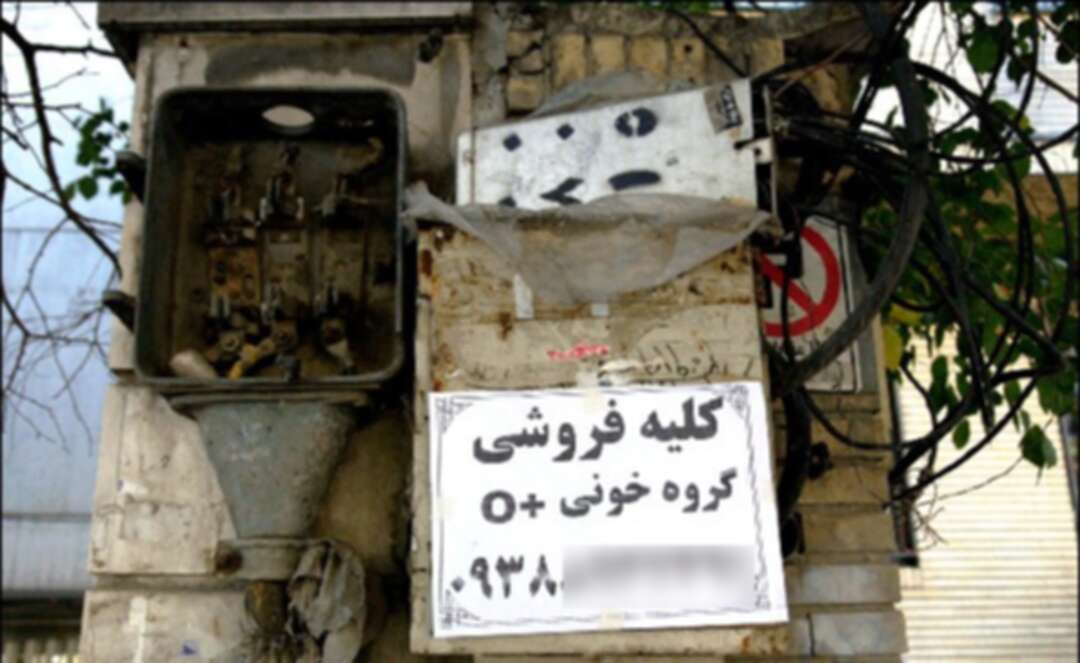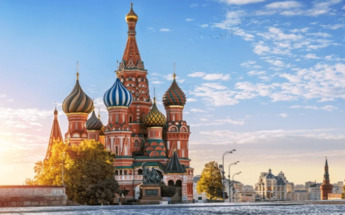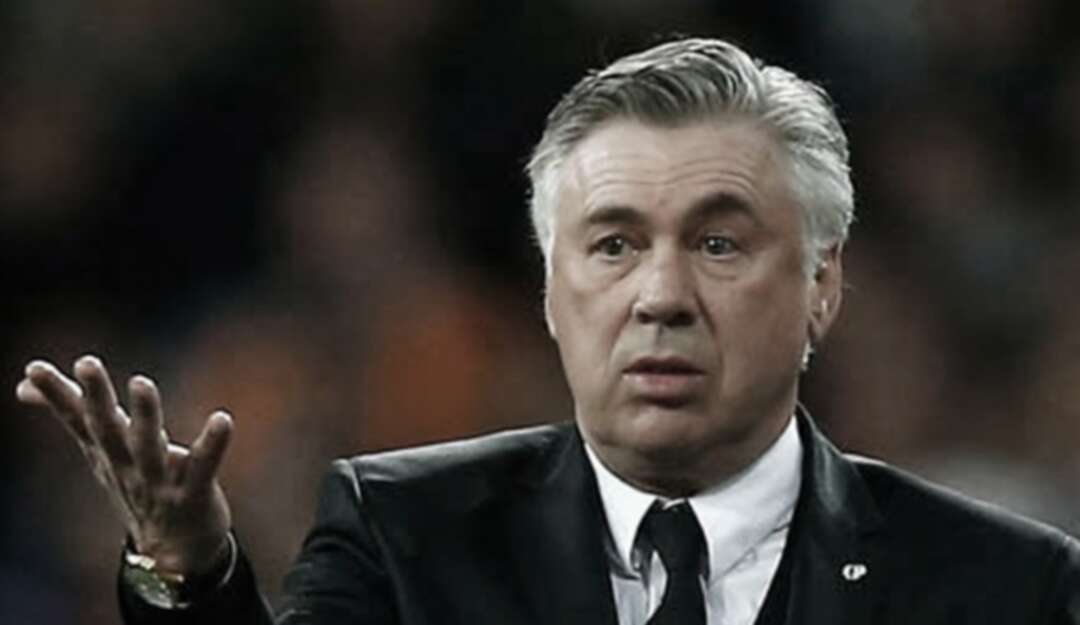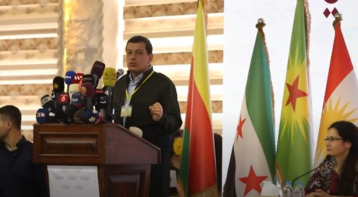-
Selling body parts: a tragedy in Iran

September 2019
Foreign Affairs Committee of National Council of Resistance of Iran
As the economy is falling apart, a lucrative business is on the rise in Iran: selling bodily organs. It might be the most unique trade in the world.
In recent years, rising living costs and poverty have greatly contributed to the booming business. It has become a systemic problem throughout the country.
Kidneys are most in demand, but a business that started more than a decade ago is no longer limited to kidney but includes liver, bone-marrow and cornea. The liver is the second most frequently traded organ. Blood plasma is the latest addition to the list.
Buyers and sellers
Buyers are those in dire need of an organ transplant.
Sellers are those in dire financial need for whom the organ market is the last resort. Sellers are both male and female. Most of those willing to sell their kidney are young people between ages 22 and 34. But there are older people who want to sell their body parts too.
Most of the buyers prefer to purchase younger organs. Since organs offered by young people are not in short supply, buyers usually have no problem in finding what they want.
The chart below provides a glimpse of the range of sellers of kidneys in early September 2019
 Latest advertisements:
Latest advertisements:
Male, 24 years old, Kidney for sale, blood type: O+
Female, 38 years old, selling liver, bone marrow, blood plasma
Female, 34 years old, buying kidney and liver (all blood types)
Female, 34 years old, selling Kidney, blood type: O+
Male, 26 years old, selling kidney, blood type: O-
Female, 22 years old, buying kidney, blood type: A+
Female 30 years old, selling kidney, blood type: B+
Male, 25 years old, buying kidney, blood type: A+
Female, 30 years old, selling kidney, blood type: B+
Female, 28 years old, Selling Kidney, blood type: O+
Average prices in a middleman market- Scope of the business
Organ prices are not fixed but constantly change. The prices depend on a number of factors such as the sellers’ age, the seriousness of the patient’s condition, the severity of the patient’s health condition, how urgently the organ is needed and how desperate the seller is. Seller’s blood type is a factor too. For example, O- and B+ blood types are more expensive.
Average Market prices in 2018
Below are rough prices for the body organs in 2018:
-Kidney: between 500 million to 1 billion rials ($5,000 to $10,000)
-Liver: between 1.5 billion to 5 billion rials ($15,000 to $50,000)
- Cornea: 2 billion rials ($20,000)
- Bone marrow: 1 billion rials ($10,000)
Statistics indicate that nearly 3,800 kidney transplants are performed in Iran every year. Of these, about 500 come from donors who are in a vegetative state. Some of the kidneys are donated by relatives to loved ones who are in dire need of kidney transplant. About 3000 kidneys are provided as a trade.
Methods of selling and buying – The lucrative business of organ brokerage
Buying and selling organs takes place by different methods.
-Direct sales
Many sellers post their contact details and details of the organ they want to sell on the walls of buildings near hospitals. The details include the sellers’ age, blood type and the organ they want to sell. Many beg the pedestrians not to erase their announcements from the wall since they are desperate and need the money urgently. The sellers usually prefer to contact the prospective candidate directly to avoid giving a commission to the middlemen.
Buying and selling through brokers
However, being a broker of bodily organs has evolved into a lucrative business for a number of people. Their job is to identify desperate people who urgently need an organ for their relative or are in dire need of the money they could obtain from selling one.
The kidney and liver markets are hot for brokers. Instagram and Telegram apps are among their preferred platforms. The middlemen have also set up websites where they ask sellers to sign up and leave their details for buyers to find. Both sides pay the broker’s commission.
One of the sites is http://koliyecenter.mihanblog.com/.
(Koliyeh in Farsi means kidney)


Images of the first two pages of the site in early September 2019.
Yassin
Hello, I do not want to sell my kidney. If someone is in real need, I am willing to donate, 34 years old, blood type: B+ Phone: 09351258580
Omid:
Selling healthy kidney, resident of Sannandaj (west Iran), blood type: O- Phone: 09182738119. Please only send sms.
Rouzbeh
Male, 26 years old, willing to sell a kidney due to financial problems. Blood type: O+. Price: 600 million rials ($5300). Phone: 09358543614
Omid:
Hello I am Omid. Willing to sell part of my live, my kidney and bone marrow on agreed price. It is urgent, urgent. If it is not done quickly, I will go to jail. The respected buyer or the broker, please send a sms first. Phone: 09267272232
Seyed Morteza
Hello. I am 27. I am healthy. I want to sell my kidney under the market price for 400 million rials ($3600). The buyer please either call or send a sms. Phone number: 09176261905. Blood type: B+. Totally healthy.
Seyed Morteza:
Hello. I am 27. I am an athlete. My kidney is completely healthy. Willing to take any test necessary. Blood type: B+. 400 million rials ($3600). It is below market price. I am not going to sell it for any lower price. Please do not bargain. Please. I need the money urgently.
Seyed Morteza:
Hello. I am 28. I run our family. For the sickness of my mother, for what I owe, want to sell my kidney. I am an athlete and totally healthy. I sell immediately. Please either send a Whatsapp message or call. Blood type: B+. Phone: 09176261905.
No name
Hello. I am willing to sell my kidney for 250 million rilas ($2,200). This is the price set by the kidney association. Since I need the money urgently, I am willing to come to anywhere in Iran. Blood type: O+. Phone: 09903615617.
Sila:
Urgent sell of healthy kidney. Blood type: A+. Phone: 09917545846.
Zahra:
Selling kidney. Blood type: +B. Price 500 million rials ($4400). Phone: 09306098563.
L:
God would damn the owner of this site.
H:
Urgent sell of Kidney. I am a 30-years old woman. Blood type: O+. Phone: 09382635890
In addition to functioning through the Internet, brokers often wander around major hospitals and approach relatives of patients who need a transplant in order to assess their financial status and make an offer an offer. Brokers often take a 50 percent commission on resulting sales.
One of the brokers who has been in the business for years explained his modus operandi in 2013:
“First I began by selling and buying kidney, near one of the hospitals in Vanak Square (a wealthy neighborhood in northern Tehran). The area nearby the hospital is filed with advertisements for selling kidneys. I spent a whole day to find sellers. I talked to them and collected the necessary information. The main problem was finding a customer. Most of the sellers I talked to were unable to identify them. But I had grown up in Bazar (traditional central market) and knew how to trade. The first step was to have access to the details of the people who needed a kidney transplant and were in a waiting list, waiting for someone to donate a kidney. After a month I obtained such a list.”
“Finally, after two months, I made my first deal. There was one person who had been looking for a healthy kidney for a long time. Most people who advertise organ sales are usually addicts or have other physical problems. So he didn't trust the ads. I was able to get connected to him. By chance, I had the telephone number of a young man who needed money to fund her mother's surgery and was ready to sell his kidney in 2008 for 60 million rials ($ 6,000 with the exchange rate at the time). To the buyer who was in a huge hurry, I offered the price of 80 million rials (equivalent to $ 8,000) and eventually the deal went on, and 20 million rials ($ 2,000) went to my pocket. Twenty million rials was not little money at the time.”
“With the initiatives I took, I was able to thrive and since 2011 I have been trading in other transplanting organs too. After two years, I hired several people to roam around hospitals and to find clients for me. Then, I hired a few people to somehow get the reports of brain-dead patients from the hospitals for me, and after that, I went on to sell other body organs.
“Now many people know me, even some physicians refer me to their patients. That's why my list of sellers and buyers is increasing every day.
“I currently have 20 marketers. There are also six guys who work in the office, I have to give a fee to the specialist doctors for advice that costs at least 500 million rilas ($ 14,000 at the time of exchange) a month and, of course, I have to pay for the psychologist and lawyer as well. Sometimes I have to change them and in order to keep them silent, I have to give them a few hundreds of millions of rials. So the current monthly cost of the operation and the office is about 700 million ($ 23,000 at the time of exchange)."
He estimated his income per month as 1 billion to 2 billion rials (28 to 56 thousand dollars a month at the exchange rate in 2013).
According to another dealer, “Most of those who sell their kidneys are from the lower strata of the society. I find them through friends who live in small towns or poor suburbs. Subsequently they are satisfied and the price is set. Of course, they are introduced as the donor and the acquaintance of the patient to make the job easier."
Alley of "Farhang Hosseini," known as "Kidney Street" in Tehran
In Tehran, Farhang Hosseini Alley (central Tehran) is known as Kidney Street. The central building of the Association of Support for Kidney patients is located in the middle of this alley.
In previous years A4 papers had filled all sides of the alley. Tags full of cell phone numbers were placed all over the walls. All the walls of this alley were full of sale advertisements. Some people had written their message on the wall or on a sheet of paper with a pen or marker. Some had painted their ads on the wall. The message of all the murals on this street’s buildings was the same: sales and purchasing ads for kidneys, livers and even corneas. The phone numbers and blood types of the sellers were also mentioned in the ads. Some ads contained dates. "Kidney A +, for sale, December 2018 ...,", "A 28-year-old, athlete, blood type O Negative... at whatever price you want "… Many insisted that they are not willing to deal with the broker and want to deal directly with the buyer.
In the last couple of years, instead of paper advertisements, the walls are filled with big, bold lines with sharp colors like red, the name of a kidney seller and his or her contact number. Throughout the alley you can't find a door, a wall, or even a garage without organ sellers’ phone numbers on them.
Some companies have officially placed big advertisements on the walls of this alley. For example: "Alvand Company, buying and selling kidneys without intermediaries; phone number”
“Kidneys of all blood types: O, B, O-, O+ and etc., are sold.”
The following are pictures of Farhang Hosseini alley.

A wall in Farhang Hosseini alley filled with selling and buying advertisements

The advertisement sign reads: “Kidney for sale. Blood type: O+

A wall in Farhang Hosseini alley filled with selling and buying advertisements

"Alvand Company, buying and selling kidneys without intermediaries; phone number”

Reactions from regime officials
A number of regime officials have formally and publicly backed the selling and buying of organs.
State run newspaper Mashregh reported on February 28, 2017 that regarding the sale of kidneys by people in extreme poverty, Dr. Hossein Ali Shahriari, a member of the Health Commission of the Majlis (parliament) said: "There is nothing wrong when a person who lives in poverty, and by receiving 200 to 300 million rials ($ 2,000 to $ 3,000 at the time exchange rate) transforms his life." The Health Commission member said: "Based on Sharia, organ transplant is not a problem and is permissible, and his holiness Imam
Regarding the fact that this is considered immoral and inhuman in most countries, he said: “How is it not immoral when they kill humans and children? Bombing women and old men and women is not inhumane?”
A few cases:
• A 30-year-old computer science PhD student offered his kidneys for sale on July 23, 2019 by posting a written text at the bus stop. He wrote that he was doing so because he was unable to afford the cost of care for his disabled mother and had no money for rent and education.
• On December 2, 2018, the state-run Salamatnews wrote: “Amir, who is about 18 years old, has auctioned his kidneys due to poverty. He doesn't want more than 500 million Rials. (5,000 dollars). He says he can no longer cope with the landlord's complaints. He and his brother have each decided to sell one of their kidneys and buy a small house with the help of a loan to relieve their mother of the suffering of not having a home. Amir said he had been trapped by dealers several times and was close to auctioning off his kidneys, but with the help of a friend who had a history of kidney sales, he drew a line around dealers, and is now looking for a real buyer without intermediaries.”
• On December 1, 2018, the state-run newspaper Shafa Online, after talking to a liver vendor who had posted an ad on a wall, wrote that the seller was a middle-aged man with a southern accent who in reply to the phone call said: "My blood group is O negative. I will sell my liver for 1.5 billion rials ($15,000). If you are a buyer, we can meet ... My child has a rare disease. Specialist doctors have diagnosed the illness differently and no one knows what my child’s main problem is. There was a gland next to his neck that became more swollen day by day until the gland became infected and since then my child’s weight has been lowering and he has fever two or three nights a week. We now live in a relative's house in Tehran around Shoosh (a poor neighborhood in south Tehran). I couldn't come to Tehran every month with my three children and my wife and go back to Bandar Abbas (southern Iran). Last month I sold my kidney and the broker got half of the money and now I want to sell part of my liver directly to cover the cost of my child's treatment.”
He continued: "In Bandar Abbas, I was a street vendor and I had Slamat health insurance. This insurance is not accepted by many physicians and hospitals in Tehran and we have to pay for the visit. So far I have spent 500 million rials but I have not succeeded. I am also ready to sell my heart to keep my child healthy. I used to be a street vendor on the streets in Tehran as well, but it is difficult to be a street peddler in Tehran, the authorities took away my goods several times and to be honest I'm sick of it. I know the liver operation is hard and the period of treatment is difficult and long, but with my sick child and financial problems, life is not easy at all. Maybe from selling my liver, some money remains and I can live with it as long as I live."
• Shahla, who had come to Tehran from Dehdasht in Kohgiluyeh and Boyer Ahmad province (west Iran) in 2017, told the Hamshahri state-run newspaper on January 14, 2109: "We have done everything you say but it is useless. Anywhere we go for work, they either want experience or references, and we have neither. So my husband decided to sell his kidney. We've brought our stuff here so they don't erase our phone numbers from the wall." She adds: "If this money comes in, it can be a huge help to our lives. I no longer have to go back to our city and live away from my wife.”
• Shahin wrote his name boldly on the wall next to the association in the alley of "Farhang Hosseini". He told the Hamshahri state-run newspaper on January 14, 2019: "The financial problems and the addiction and illness of family members have made me reach to the bottom of the line and so I want to sell my kidney. Anyone who calls me requests a discount. As if they are all worse off than me, but there is no one telling them we are not bargaining over a few pounds of chicken and meat."
He said he has been called several times from the Association to erase his number from the wall, but he has no choice: “If I can't afford to pay for my family, the landlord will throw our belongings in the street. I have also told this to association authorities… I am not seeking a high price. Do you think 200 million rials ($2,000) is too much for a kidney?”
Conclusions, Observations:
The tragedy of Iranians, especially the youths, selling their body parts to survive or to address their own basic needs or those of their families in a country like Iran is an untold catastrophe. Iran’s population is one percent of the world’s population, yet has seven percent of the world’s natural resources; it is among the richest.
Through embezzlement, theft and astronomical pillaging of these resources, the Iranian regime’s leaders have devoted most of these resources to suppression at home and export of terrorism as well as arming, training and financing terrorist groups, fomenting proxy wars in the Middle East and working to obtain weapons of mass destruction. This is while a vast majority of the Iranian people live below the poverty line with no prospects for improvement in their daily life.
The lion’s share of the Iranian nation’s wealth has been plundered by the Supreme Leader Ali Khamenei, his office and the Islamic Revolutionary Guard Corps (IRGC). Khamenei’s personal wealth is reported to be around $200 billion dollars. In addition to huge sums allocated to the repressive agencies, the regime has allotted several billion dollars to prop up the Syrian dictator Bashar Al-Assad and roughly a billion dollars a year to the terrorist Hezbollah in Lebanon. It has also been extensively financing and helping the Houthis in Yemen and the terrorist Shia militias in Iraq.
The painful trend of selling body parts continued and even intensified following the signing of the Iran Nuclear Deal (the Joint Comprehensive Plan of Action, JCPOA), which released more than 100 billion dollars and enabled the regime to sell more than two million barrels of oil on a daily basis. As the Iranian Resistance said at the time, this windfall was not spent on improving the abysmal living conditions of the Iranian people.
In the nationwide uprising in 2018, which spread to more than 160 cities, the Iranian people demanded the overthrow of the regime in its entirety. The deprived and destitute masses played a critical role in that upheaval. Keenly aware of the explosive state of society, the regime’s officials repeatedly warn of another major upheaval and have grown quite paranoid over the bleak prospects awaiting them.
Selling body parts: a tragedy in Iran
Selling body parts: a tragedy in Iran Selling body parts: a tragedy in Iran Selling body parts: a tragedy in Iran Selling body parts: a tragedy in Iran Selling body parts: a tragedy in Iran Selling body parts: a tragedy in Iran Selling body parts: a tragedy in Iran
<2> koliyecenter.mihanblog.com
<3> https://www.isna.ir/news/92091913732/%D9%86%D8%A7%DA%AF%D9%81%D8%AA%D9%87-%D9%87%D8%A7%DB%8C-%D8%AA%DA%A9%D8%A7%D9%86-%D8%AF%D9%87%D9%86%D8%AF%D9%87-%DB%8C%DA%A9-%D8%AF%D9%84%D8%A7%D9%84-%D8%A7%D8%B9%D8%B6%D8%A7%DB%8C-%D8%A8%D8%AF%D9%86
<4> http://www.salamatnews.com/news/259281/%D8%A7%DB%8C%D9%86%D8%AC%D8%A7-%D8%AC%D9%80%D8%A7%D9%86-%D9%85%DB%8C%E2%80%8C%D9%81%D8%B1%D9%88%D8%B4%D9%86%D8%AF
<5> http://shafaonline.ir/fa/news/215641/%D8%AD%D8%B1%D8%A7%D8%AC-%D8%A8%D9%87-%D9%82%DB%8C%D9%85%D8%AA-%D8%B2%D9%86%D8%AF%DA%AF%DB%8C
<6> http://newspaper.hamshahri.org/id/44619/%DA%AF%D8%B1%D8%A7%D9%81%DB%8C%D8%AA%DB%8C%E2%80%8C%D9%87%D8%A7%DB%8C%DB%8C-%D8%A8%D8%B1%D8%A7%DB%8C-%DA%A9%D9%84%DB%8C%D9%87.html
<7> Ibid
Tags
You May Also Like
Popular Posts
Caricature
BENEFIT Sponsors BuildHer...
- April 23, 2025
BENEFIT, the Kingdom’s innovator and leading company in Fintech and electronic financial transactions service, has sponsored the BuildHer CityHack 2025 Hackathon, a two-day event spearheaded by the College of Engineering and Technology at the Royal University for Women (RUW).
Aimed at secondary school students, the event brought together a distinguished group of academic professionals and technology experts to mentor and inspire young participants.
More than 100 high school students from across the Kingdom of Bahrain took part in the hackathon, which featured an intensive programme of training workshops and hands-on sessions. These activities were tailored to enhance participants’ critical thinking, collaborative problem-solving, and team-building capabilities, while also encouraging the development of practical and sustainable solutions to contemporary challenges using modern technological tools.
BENEFIT’s Chief Executive Mr. Abdulwahed AlJanahi, commented: “Our support for this educational hackathon reflects our long-term strategic vision to nurture the talents of emerging national youth and empower the next generation of accomplished female leaders in technology. By fostering creativity and innovation, we aim to contribute meaningfully to Bahrain’s comprehensive development goals and align with the aspirations outlined in the Kingdom’s Vision 2030—an ambition in which BENEFIT plays a central role.”
Professor Riyadh Yousif Hamzah, President of the Royal University for Women, commented: “This initiative reflects our commitment to advancing women in STEM fields. We're cultivating a generation of creative, solution-driven female leaders who will drive national development. Our partnership with BENEFIT exemplifies the powerful synergy between academia and private sector in supporting educational innovation.”
Hanan Abdulla Hasan, Senior Manager, PR & Communication at BENEFIT, said: “We are honoured to collaborate with RUW in supporting this remarkable technology-focused event. It highlights our commitment to social responsibility, and our ongoing efforts to enhance the digital and innovation capabilities of young Bahraini women and foster their ability to harness technological tools in the service of a smarter, more sustainable future.”
For his part, Dr. Humam ElAgha, Acting Dean of the College of Engineering and Technology at the University, said: “BuildHer CityHack 2025 embodies our hands-on approach to education. By tackling real-world problems through creative thinking and sustainable solutions, we're preparing women to thrive in the knowledge economy – a cornerstone of the University's vision.”
opinion
Report
ads
Newsletter
Subscribe to our mailing list to get the new updates!






















